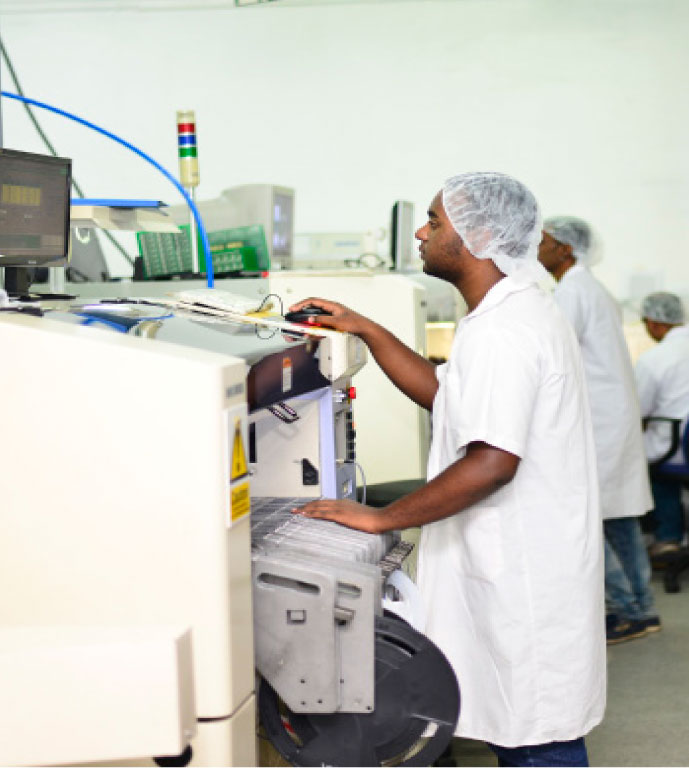Rotrax International : soaring to new heights
Share

Located in Freeport Zone 7, Mer Rouge, Rotrax International has been assembling printed circuit boards for robotic devices since its inception, 15 years ago. Currently, it plans to take a stepforward by manufacturing drones.
One of the rare companies in Mauritius to be engaged in the manufacturing of sophisticated electronic products, Rotrax International is also the only one in Mauritius specialized in the assembly of printed circuit boards (PCBs) using state-of-the-art Samsung pick and place SMT machines. According to Mohan Kalasekaran, General Manager, these wireless technology products are usually ordered by companies which design and produce robots or other custom-built automated machines. Thus equipped, the latter are able to respond to commands or communicate automatically with one another through a wireless data transmission system. Such devices are even used by foreign governments for
defense purposes as they can spot and destroy live ammunitions, used in satellites, marine applications, commercial applications such as agricultural spraying, mapping and surveying, utilities (water leak detection, general monitoring, meter reading, load management controller, haulage/shipping), asset tracking and tracing, access control, logging for machine safety monitors and controls, security, intruder detection, fire alarms, help point, forestry, healthcare, sport, entertainment, mining. “Communications and applications are endless”, specifies the GM who settled in Mauritius since the foundation of Rotrax International, in 2001.
Rotrax International is established in Freeport Zone 7, Mer Rouge. Mohan Kalasekaran, as the GM, was retiring from his previous activity and was brought in by the investors to set up and establish their project. The company was launched with the aim of capable of assembling PCBs and specializing in miniature wireless data transmission products. Considering that the stable political climate and international financial institutions was ideal to start such a business enterprise in Mauritius, and the fact that the island already had good regulatory frameworks at the time, they started Rotrax International with only re-exported PCBs. However, later on, the Mauritian-based company began to assemble these commodities, for which it found a market in Europe, US, Australia, China, India. Today, 80% of its goods are still conveyed to the old continent.
Technicians recruited from MITD
As GM, one of Mohan Kalasekaran’s missions was to build a professional team which would be sufficiently qualified to face the challenge of producing highly advanced electronic equipment, a domain where no Mauritian firm had ever ventured before. He thus recruited technicians from the Mauritius Institute of Training and Development (MITD) and, as one employee tells us, the kind of work that was expected from his colleagues and himself at Rotrax International was totally different from the know-how they had acquired at the MITD. As a consequence, the company had to turn to foreign trainers so that the local people it had employed could acquire the necessary competencies in a brand new field, at Mauritian level.
Gradually, the business flourished, at its peak and Rotrax International had some 35 employees until the global economic meltdown of 2007-2008. The aftermath of the financial crisis was felt as soon as 2009 by the medium-sized company. Its sales plummeted while European governments reduced their budgets for robotics in the fields of medicine and defense applications. Additionally, Rotrax International had to struggle to compete with Chinese companies which could produce entire automatic machines along with the communication transmission devices that include PCBs since they had an easier reach to capital, infrastructure and workforce.
Rotrax International is proud to announce that the products it manufactures are now used in China. Under these circumstances, the annual turnover of the Mauritian-based company fell by a quarter and, ere long, it had to give up some parts of the building it occupies in Freeport Zone 7. As for its employees, 15 of them were retained, along with all the SMT machinery. Presently, though, Rotrax International can still work around the clock and fulfill orders within a week, states Mohan Kalasekaran.
So as to fulfill important orders as quickly as possible, Rotrax International stores up to £500 thousand worth materials. This is also necessary since Mauritius is quite far away from UK, China and Japan, from which some of the PCBs’ key components are imported. As a result, for any project the company is about to undertake, 90% of the materials needed are within reach while only 10% will have to be sourced from outside. So far, Rotrax International has been providing PCBs to major companies in the defense and medical industries but it is now about to step into its second phase of development.
Mohan Kalasekaran effectively told us that the company has recently negotiated with authorities for more room because it plans to develop and produce drones locally. Besides, an initial investment of Rs 10 million has already been earmarked for this project which should materialize in about 18 months. These pilotless radio-controlled aircrafts, the GM points out, are intended for foreign governments that will use them for remote area mapping and agricultural spraying. The only problem Rotrax International will have to overcome, Mohan Kalasekaran goes on to say, is the fact that radio frequencies and their radiated power vary from country to country and this can be overcome by using high level software application.
Apart from this issue, the Mauritian-based company masters the technology pertaining to drone controllers and also wishes to build drones for commercial applications. Until now, Rotrax International has remained far from media limelight but it has henceforth decided to promote itself as a company that has mastered high-end technology, an endeavor which can only reflect positively on a country seeking to become a digital hub.









